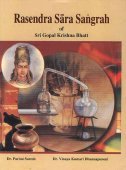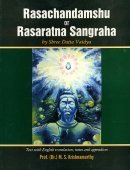Upavisha, Upaviṣā, Upaviṣa: 10 definitions
Introduction:
Upavisha means something in Hinduism, Sanskrit. If you want to know the exact meaning, history, etymology or English translation of this term then check out the descriptions on this page. Add your comment or reference to a book if you want to contribute to this summary article.
The Sanskrit terms Upaviṣā and Upaviṣa can be transliterated into English as Upavisa or Upavisha, using the IAST transliteration scheme (?).
In Hinduism
Ayurveda (science of life)
Rasashastra (Alchemy and Herbo-Mineral preparations)
Source: Wisdom Library: Rasa-śāstraUpaviṣa (उपविष) either refers to “semi (lesser) poisons” or “manufactured poisons”. It can be derived from various parts of plants, which are toxic and hallucinogenic but usually non-lethal, unless taken excessively. The fourteenth chapter of Mādhava’s 7th century Āyurvedaprakāśa deals with poisons (viṣa) and semi-poisons (upaviṣa).
Source: Google Books: Iatro-chemistry of Āyurveda, RasaśāstraUpaviṣa (उपविष) refers to “subsidiary poisons”.—Nāgārjuna, etc., have described five drugs, viz., snuhī, arka, karavīra, lāṅgalī and viṣa-muṣṭi as upaviṣas (subsidiary poisons).
Toxicology (Study and Treatment of poison)
Source: Ancient Science of Life: Śodhana: An Ayurvedic process for detoxificationUpaviṣa (उपविष) refers to “poisonous plants” (but not lethal for human health), which can be detoxified/purified using the Śodhana process, which involves the purification as well as reduction in the levels of toxic principles according to Ayurvedic principles.—Traditionally, plants having various classes of phytochemicals are still in use either in their crude form or after proper processing. Though most of the plant drugs are safe, yet few are toxic for human health. These poisonous/toxic plants are categorized as viṣa (poison) and upaviṣa (toxic but not lethal for human health) in Ayurvedic texts [...].
Unclassified Ayurveda definitions
Source: gurumukhi.ru: Ayurveda glossary of termsUpaviṣa (उपविष):—[upaviṣaḥ] A class of following semi poisonous plants

Āyurveda (आयुर्वेद, ayurveda) is a branch of Indian science dealing with medicine, herbalism, taxology, anatomy, surgery, alchemy and related topics. Traditional practice of Āyurveda in ancient India dates back to at least the first millenium BC. Literature is commonly written in Sanskrit using various poetic metres.
Languages of India and abroad
Sanskrit dictionary
Source: DDSA: The practical Sanskrit-English dictionaryUpaviṣa (उपविष).—
1) An artificial poison.
2) A narcotic, any poisonous drug; अर्कक्षीरं स्नुहीक्षीरं तथैव कलिहारिका । धत्तूरः करवीरश्च पञ्च चोपविषाः स्मृताः (arkakṣīraṃ snuhīkṣīraṃ tathaiva kalihārikā | dhattūraḥ karavīraśca pañca copaviṣāḥ smṛtāḥ) ||
-ṣā Name of a plant (ativiṣā) It is a plant used in medicine. The bark is employed in dying. It is white, red and black (Atis or Betula). It is also referred to as उपविषाणिका (upaviṣāṇikā).
Derivable forms: upaviṣaḥ (उपविषः), upaviṣam (उपविषम्).
Source: Cologne Digital Sanskrit Dictionaries: Shabda-Sagara Sanskrit-English DictionaryUpaviṣa (उपविष).—n.
(-ṣaṃ) 1. Factitious poison. 2. A narcotic, any deleterious drug, as opium, &c. E. upa like, viṣa poison. f.
(-ṣā) A plant, Atis. E. upa reverse, and viṣa poison: an antidote.
Source: Cologne Digital Sanskrit Dictionaries: Monier-Williams Sanskrit-English Dictionary1) Upaviṣa (उपविष):—[=upa-viṣa] n. factitious poison, a narcotic, any deleterious drug (as opium, datura, etc.)
2) Upaviṣā (उपविषा):—[=upa-viṣā] [from upa-viṣa] f. the plant Aconitum Ferox, [cf. Lexicographers, esp. such as amarasiṃha, halāyudha, hemacandra, etc.]
Source: Cologne Digital Sanskrit Dictionaries: Yates Sanskrit-English Dictionary1) Upaviṣa (उपविष):—[upa-viṣa] (ṣaṃ) 1. n. Factitious poison.
2) Upaviṣā (उपविषा):—[upa-viṣā] (ṣā) 1. f. A plant, (Atis.)
[Sanskrit to German]
Sanskrit, also spelled संस्कृतम् (saṃskṛtam), is an ancient language of India commonly seen as the grandmother of the Indo-European language family (even English!). Closely allied with Prakrit and Pali, Sanskrit is more exhaustive in both grammar and terms and has the most extensive collection of literature in the world, greatly surpassing its sister-languages Greek and Latin.
See also (Relevant definitions)
Starts with: Upavishaaka, Upavishamashitajvara, Upavishanaka, Upavishanika.
Full-text: Pravisha, Ayurvedaprakasha, Ativisa, Visha, Vipad, Vipadimantra, Vipadi, Garudamantra, Gara.
Relevant text
Search found 1 books and stories containing Upavisha, Upaviṣā, Upaviṣa, Upavisa, Upa-visha, Upa-viṣa, Upa-visa, Upa-viṣā; (plurals include: Upavishas, Upaviṣās, Upaviṣas, Upavisas, vishas, viṣas, visas, viṣās). You can also click to the full overview containing English textual excerpts. Below are direct links for the most relevant articles:
Related products


